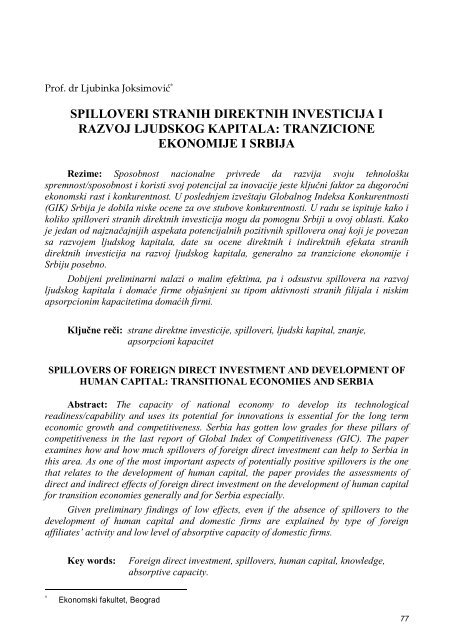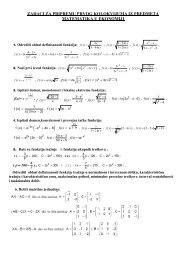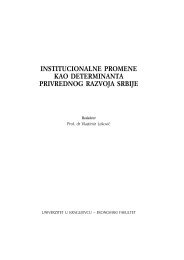- Page 1:
UNIVERZITET U KRAGUJEVCU EKONOMSKI
- Page 4 and 5:
iv Prof. dr Emilija Vuksanović, mr
- Page 6 and 7:
vi Doc. dr Vesna Stojanović-Aleksi
- Page 8 and 9:
viii Emilija Vuksanović, Ph.D., Vi
- Page 10 and 11:
x Edin Ramić, M.Sc. FOREIGN DIRECT
- Page 13 and 14:
Prof. Alessio Lokar ∗ Prof. Lubic
- Page 15 and 16:
Table 1: FDI Flows to Emerging Mark
- Page 17 and 18:
C. FDI in Central and Eastern Europ
- Page 19 and 20:
D. Comparison between Russia, Polan
- Page 21 and 22:
emain two possible strategies: fore
- Page 23 and 24:
If we take into account the UNCTAD
- Page 25 and 26:
Economic Variables Unemployment Rat
- Page 27 and 28:
2007 and 2008, is about a certain r
- Page 29 and 30:
application of fiscal measures, lik
- Page 31 and 32:
If in Slovenia, Poland and Russia t
- Page 33 and 34:
Prof. Patrizia Tiberi Vipraio ∗ H
- Page 35 and 36: desirable, to accelerate the recove
- Page 37 and 38: To sum up the present discussion, a
- Page 39 and 40: decoding of spilled knowledge etc.
- Page 41 and 42: 4. Is there a scope for Development
- Page 43 and 44: ‘right’ combination of ‘marke
- Page 45 and 46: Prof. Pece Nedanovski, Ph.D. * Kate
- Page 47 and 48: institutionalists aim at having a w
- Page 49 and 50: esponsible for maintaining the macr
- Page 51 and 52: contact and they have mutual coordi
- Page 53 and 54: Institutions responsible for creati
- Page 55 and 56: procedures and 408.8 days, whereas
- Page 57 and 58: • Supporting the stability and co
- Page 59 and 60: References 1. Nicola Acocella, Econ
- Page 61 and 62: Bigger inflow of FDI as well as str
- Page 63 and 64: Takođe se može primetiti rastući
- Page 65 and 66: narednim godinama znatnije povećao
- Page 67 and 68: pojačaju izvozne potencijale doma
- Page 69 and 70: tabelu 3.). Uprkos tome, očigledno
- Page 71 and 72: Help?, IMF Working Paper wp/05/110,
- Page 73 and 74: attract FDI, but policies have been
- Page 75 and 76: However, larger share of the foreig
- Page 77 and 78: financial intermediation or tourism
- Page 79 and 80: Chart 2: FDI and merchandise export
- Page 81 and 82: The Western Balkan still lack expor
- Page 83 and 84: Appendix: Current account and Trade
- Page 85: Kreiranje institucionalnog okvira z
- Page 89 and 90: tako uočava se da Srbija ima niske
- Page 91 and 92: prisustva novih filijala MNP. Indir
- Page 93 and 94: suprotno porast zaposlenosti u stra
- Page 95 and 96: adnika (inženjera i drugih stručn
- Page 97 and 98: 3. Moguća objašnjenja Nekoliko ob
- Page 99 and 100: da domaća privreda mora da poseduj
- Page 101 and 102: 4 - kvalitet javnih obrazovnih usta
- Page 103 and 104: 12. Konings, J., 2001, The Effects
- Page 105 and 106: Dr Ljubodrag Savić, v.prof. * STRA
- Page 107 and 108: angiranih zemljama u tranziciji. Is
- Page 109 and 110: Tabela 1 Godišni i kumulirani pril
- Page 111 and 112: Osnovne karakteristike razvoja Srbi
- Page 113 and 114: Priliv SDI u Srbiju Oporavak privre
- Page 115 and 116: Zadnji izbori i trenutna politička
- Page 117 and 118: Zaključak U savremenom periodu glo
- Page 119 and 120: Prof. dr Radoslav Stefanović * Mr
- Page 121 and 122: harmonizuje regulativu između trž
- Page 123 and 124: Izveštavanje Vremenski okvir Među
- Page 125 and 126: Tabela 3 - Polugodišnji finansijsk
- Page 127 and 128: Tabela 4 - Godišnji finansijski iz
- Page 129 and 130: * * * Naša zemlja se nalazi u proc
- Page 131 and 132: At present, regulatory framework of
- Page 133 and 134: Drugo, adekvatan regulatorni okvir
- Page 135 and 136: tno depozitno osiguranje, deponenti
- Page 137 and 138:
institucija, uključujući i nekred
- Page 139 and 140:
privredi (čime se karakteriše glo
- Page 141 and 142:
anaka i drugih finansijskih organiz
- Page 143 and 144:
sačinjen u skladu sa modernim evro
- Page 145 and 146:
Prof.dr Tatjana Djurić Kuzmanović
- Page 147 and 148:
kapitalnointenzivnom proizvodnjom,
- Page 149 and 150:
kapitalizma tako što olakšavaju t
- Page 151 and 152:
dečijeg rada u Indoneziji) ili jo
- Page 153 and 154:
ekonomiji, sve više postaje oprede
- Page 155 and 156:
organizacijama. Socijalni projekti
- Page 157 and 158:
Optužbe, koje su dolazile od stran
- Page 159 and 160:
20. Klein Naomi, 2001, No logo, Lon
- Page 161 and 162:
practices is achieved by establishi
- Page 163 and 164:
osnivanje novih preduzeća (izgradn
- Page 165 and 166:
od primenjene normativne regulative
- Page 167 and 168:
uporedivosti finansijskih izveštaj
- Page 169 and 170:
finansijskih izveštaja. Ovim istra
- Page 171 and 172:
Od 1. januara 2005. godine propisan
- Page 173 and 174:
Institut ima i zadatak da izdaje po
- Page 175 and 176:
Zaključak U uslovima funkcionisanj
- Page 177 and 178:
Mr Marija Petrović-Ranđelović *
- Page 179 and 180:
opšte potrošnje (tj. ulaganje u o
- Page 181 and 182:
ulogu u određivanju lokacije izvoz
- Page 183 and 184:
o lokaciji stranih direktnih invest
- Page 185 and 186:
ezmiza ili poreski oproštaj, ili o
- Page 187 and 188:
3) Savremeni problemi u globalnoj e
- Page 189 and 190:
ekvivalentne. U tom kontekstu, mož
- Page 191 and 192:
Interesantno je napomenuti da jedna
- Page 193 and 194:
1. Finansijske olakšice u formi do
- Page 195 and 196:
component of social capital and an
- Page 197 and 198:
zemlje sa najpovoljnijim ekonomskim
- Page 199 and 200:
štednji i investiranju zasnovane n
- Page 201 and 202:
nisu postojale i preduzeća nisu is
- Page 203 and 204:
omogućava članovima društva da s
- Page 205 and 206:
Ovi pozitivni efekti poverenja na e
- Page 207 and 208:
Globalizacija finansijskih tokova
- Page 209 and 210:
Prof. dr Zdenka Đurić * METODOLO
- Page 211 and 212:
- stranim direktnim investicijama i
- Page 213 and 214:
novac državi. U meri u kojoj je dr
- Page 215 and 216:
faktora, primat imaju interni fakto
- Page 217 and 218:
- David Doneij u svojoj analizi bav
- Page 219 and 220:
kapitalizmu", o denacinalizacijama
- Page 221 and 222:
Prof. dr Evica Petrović, Doc. dr K
- Page 223 and 224:
2. Rizik zemlje: pojavni oblici i p
- Page 225 and 226:
S obzirom da rizik zemlje može ima
- Page 227 and 228:
The country spread model dodaje za
- Page 229 and 230:
je tokom 2006. i 2007.god. došlo d
- Page 231 and 232:
9. Gaba, V., Pan Y., Ungson, G.R. (
- Page 233 and 234:
1. Sektor domaćinstva kao izvor fi
- Page 235 and 236:
13.828 miliona dinara, i da su u is
- Page 237 and 238:
nisu zabeležene. Međutim, da za S
- Page 239 and 240:
dr Slavica Manić * NEKI ASPEKTI GL
- Page 241 and 242:
U literaturi se ekonomska tranzicij
- Page 243 and 244:
trgovine, da bi 50-ih i 60-ih godin
- Page 245 and 246:
može ubrzati u značajnoj meri dal
- Page 247 and 248:
privuči značajne dodatne SDI ako
- Page 249 and 250:
Međutim, potencijalno su mogući i
- Page 251 and 252:
koje se usled kašnjenja u tranzici
- Page 253 and 254:
30. SPSEE (2004), Chairman’ Concl
- Page 255 and 256:
knowledge and technology, create a
- Page 257 and 258:
pravcu otvaranja svojih ekonomija k
- Page 259 and 260:
Slika 2 : Jugoistočna Evropa i Zaj
- Page 261 and 262:
Tekovine IDI-ja u tranzicionim ekon
- Page 263 and 264:
Veći broj zemalja u tranziciji bel
- Page 265 and 266:
almost finished transitional proces
- Page 267 and 268:
ivših zemalja tzv. realsocijalizma
- Page 269 and 270:
Sa početkom procesa tranzicije, ze
- Page 271 and 272:
uglavnom su kompatibilne sa ulaganj
- Page 273 and 274:
Tabela br 7: Strana ulaganja u R. S
- Page 275 and 276:
Uticaj političkih prilika u veliko
- Page 277 and 278:
Dr Saša Obradović * REZULTATI PRO
- Page 279 and 280:
Inicijalno je potencijalni iznos kr
- Page 281 and 282:
Rezultati programa makroekonomske s
- Page 283 and 284:
Efekti MMF programa na ekonomske pe
- Page 285 and 286:
poriče da je to rigidno doktrinarn
- Page 287 and 288:
likvidnosti. Kao krajnja mera predv
- Page 289 and 290:
Docent dr Milena Jakšić * ANALIZA
- Page 291 and 292:
koji nivo bogatstva, dati pad bogat
- Page 293 and 294:
Korišćenjem jednačine (1.) i (2.
- Page 295 and 296:
Potrebno je uočiti da nije svaki p
- Page 297 and 298:
stvara se set portfolio mogućnosti
- Page 299 and 300:
tački nagib krive indiferencije (k
- Page 301 and 302:
Standardna devijacija prinosa u dom
- Page 303 and 304:
dr Slobodan Marković * Biljana Laz
- Page 305 and 306:
na poslovno okruženje i unapređen
- Page 307 and 308:
odnose preduzeća pre spajanja, tad
- Page 309 and 310:
napore kako bi u što kraćem roku
- Page 311 and 312:
uspešnih tranzitornih zemalja. Naj
- Page 313 and 314:
inostranih investicija su pristigli
- Page 315 and 316:
U Albaniji je priliv stranih direkt
- Page 317 and 318:
Doc. dr Ljiljana Stošić Mihajlovi
- Page 319 and 320:
- Prihvatanju raznolikosti i način
- Page 321 and 322:
preduzeća i njihovo smanjivanje u
- Page 323 and 324:
Područje / problemi Ciljevi Mere i
- Page 325 and 326:
uspešnosti Nacionalne strategije i
- Page 327 and 328:
Uvod Tržišna pozicija institucija
- Page 329 and 330:
u Srbiji, gde je inflacija, koja ob
- Page 331 and 332:
27% tržišnog udela u ovoj zemlji,
- Page 333 and 334:
Slika 3. Tržišni udeo Triglav osi
- Page 335 and 336:
poslovima neživotnog osiguranja, a
- Page 337 and 338:
9. Merkur osiguranje počelo sa rad
- Page 339 and 340:
našle u ekonomski nezavidnoj pozic
- Page 341 and 342:
Tabela 1: Izvoz i uvoz evropskih ze
- Page 343 and 344:
je na blizu 200 milijardi dolara, a
- Page 345 and 346:
promena robne strukture izvoza zaht
- Page 347 and 348:
MAKEDONIJA POLJSKA RUMUNIJA SLOVENI
- Page 349 and 350:
Svetska banka koristi podelu svih p
- Page 351 and 352:
ili faktori njihovih slabih ekonoms
- Page 353 and 354:
preporučivale politiku Vašingtons
- Page 355 and 356:
u Evropskoj uniji. Želja evropskih
- Page 357 and 358:
Mr Sandra Stojadinović Jovanović
- Page 359 and 360:
u ekonomskoj politici i nastavak sp
- Page 361 and 362:
zemalja koje su se priključile EU
- Page 363 and 364:
Slika 2 Jugoistočna Evropa i Zajed
- Page 365 and 366:
posredovanje, potom saobraćaj (tel
- Page 367 and 368:
Zaključak Može se zaključiti da
- Page 369 and 370:
mr Dragana Labović * CENA KAPITALA
- Page 371 and 372:
Preduzeća iz različitih delova sv
- Page 373 and 374:
U svakom preduzeću amortizacija je
- Page 375 and 376:
- preferencijalne akcije nemaju rok
- Page 377 and 378:
- očekivana kamata i dividenda su
- Page 379 and 380:
Tabela br.3. R.B. E L E M E N T I V
- Page 381 and 382:
Mr Marijana Ljubić * GLOBALIZACIJA
- Page 383 and 384:
savremenim raspravama preuveličan.
- Page 385 and 386:
- Načine očuvanja konkurentnosti
- Page 387 and 388:
iti samo 1.9 %. Pod udarom krize hi
- Page 389 and 390:
4. Strategija partnerstva za Srbiju
- Page 391 and 392:
neproporcionalnost između ekonomsk
- Page 393 and 394:
Uvod Politička stabilnost i sigurn
- Page 395 and 396:
• imaju neograničeno pravo otvar
- Page 397 and 398:
Tabela 2: Strane direktne investici
- Page 399 and 400:
Zaključak Obimom uloženog kapital
- Page 401 and 402:
Transnacionalne korporacije u globa
- Page 403 and 404:
Dr Momčilo Đorđević * NAČINI S
- Page 405 and 406:
internacionalizaciju svih transakci
- Page 407 and 408:
Zajednička ulaganja su moguća u s
- Page 409 and 410:
2. Smanjivanje vremena inovacije pr
- Page 411 and 412:
firme, locirane u različitim zemlj
- Page 413 and 414:
leadership and the characteristics
- Page 415 and 416:
Tabela 1 - Racionalno vs. etičko l
- Page 417 and 418:
slabosti. Razvoj etičkih principa
- Page 419 and 420:
U tom procesu lider koristi različ
- Page 421 and 422:
Dr Dejan Grujić * RAZVOJ TRANSNACI
- Page 423 and 424:
i pragmatičniji pristup od strane
- Page 425 and 426:
3. Osobine transnacionalnih korpora
- Page 427 and 428:
taj način je upravljačka aktivnos
- Page 429 and 430:
Naravno da ne postoji neki čarobni
- Page 431 and 432:
izbjegnu pohlepu i strukturiraju sp
- Page 433 and 434:
Svetski prosek Bosna I Hercegovina
- Page 435 and 436:
Literatura 1. „Ekonomski leksikon
- Page 437 and 438:
Introduction One hundred largest Am
- Page 439 and 440:
• New development trends are stim
- Page 441 and 442:
Products and technologies which wer
- Page 443 and 444:
mr Srđan Šapić * STRANE DIREKTNE
- Page 445 and 446:
Da bi preduzeće donelo te odluke n
- Page 447 and 448:
Okruženje (ekonomsko, političko,
- Page 449 and 450:
• povećanje tehnološke zavisnos
- Page 451 and 452:
kapitalu sumnjivog porekla ili ne.J
- Page 453 and 454:
5. Srbija i SDI U zemljama srednje
- Page 455 and 456:
ulaganja može podleći oporezivanj






